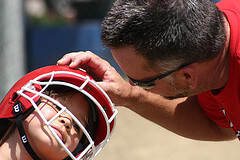As a coach, you serve roles. You fulfill the role of parent, educator, friend, disciplinarian, motivator and psychologist as well as many other roles which go without mentioning. By no means is being a coach an easy task.
Fortunately, fulfilling each of these roles provides daily challenges which keep coaches in the field. Similarly it is not easy to be an athlete who plays three or four different positions and tries to be as good as an athlete who specializes at one position. Definitely, not an easy task. Luckily, we as coaches have the ability to make this an easier and more rewarding task.

In my article, I mentioned several physical and mental strategies an athlete can use in dealing with the challenges facing the utility player. Now, I would like to address what coaches can do to provide a positive, challenging and rewarding environment.
As coaches, I think it is important to remember how difficult it is to play a variety of positions or to serve as the designated player. Imagine yourself coming up to bat with two outs in the bottom of the seventh inning with the winning run at second base having struck out in your two previous at bats. Remember, you have been sitting on the bench for seven innings while your teammate played defense. Try to imagine the thoughts that would be running through your head. Imagine the confidence that this athlete must possess to succeed in this situation. The scenario gets tougher. The hitter lets the first two pitches go by and they are both strikes. If the player looks down at you and sees that you have no confidence in her, she will most likely feel abandoned, having failed to win your confidence and praise. However, if this athlete looks at you and you are encouraging as always, she will most likely have the confidence she has always possessed and realize at the two previous at-bats the pitcher was lucky to strike her out. The point being that any utility player has a tough job. Whether it be hitting three times a game or playing one position one day and another tomorrow, it is a difficult job.
Fortunately, as coaches we can make a difference. As much as it is the athlete’s responsibility to work at making practices and games challenging and rewarding, some responsibility must also lie with coaches. If a coach asks a player to fulfill roles that are unfamiliar to the athlete, then the coach must be willing to aid in the process. Athletics are a joint effort. Both the coach and the player need to work in cooperation with one another. For example, if the coach has asked a player to learn shortstop, then the coach must be willing to spend time and energy to teach the skills necessary to play a position.
Furthermore, it is up to the athlete also to put forth the effort and remain positive even if progress is slow.
The bottom line is communication. If a coach communicates his/her expectations to the athlete and explains why this is important to the team, then the athlete needs to be willing to work at this role. For both the athlete and coach, it is not going to be easy. The athlete might think she is not appreciated or being asked to do too many things. Here, the coach needs to take the time daily to make sure the athlete is being provided with a positive learning environment. On the contrary, the athlete must also give this position a fair chance.
It takes a great deal of patience and understanding on behalf of everyone. However, the coach needs to communicate the importance of the position and why it is so invaluable to the team’s success. As a coach, if you express the role and its importance to the team, and are supportive to the player or players involved, it will greatly enhance both the team’s and the individual’s success.
Keys to motivating the Utility Player
1) Be encouraging and supportive. In practice, games and individual contacts, express concern for the athlete’s needs.
2) Take the time to teach the basics. Make sure that the athlete knows the necessary skills to perform at each position.
3) Keep the lines of communication open. Encourage the athlete to seek additional help in all stages of the learning process.
4) Remind the athlete frequently how special she is to the team and how you think she is progressing.
5) Pay close attention to the athlete’s progress both mentally and physically. If you notice frustration or fading interest, address the issue.
6) Keep practice challenging and rewarding. Provide games or drills that might showcase the athlete’s ability at a position
7) STAY POSITIVE….The athlete needs to know that you believe in her ability. Everyone makes mistakes. Remind the athlete that she is good and progressing well.
These suggestions are applicable to all athletes and all situations. The important thing to remember is that you show the athlete that you do care and you want everyone to reach our and strive for their goals!!!!